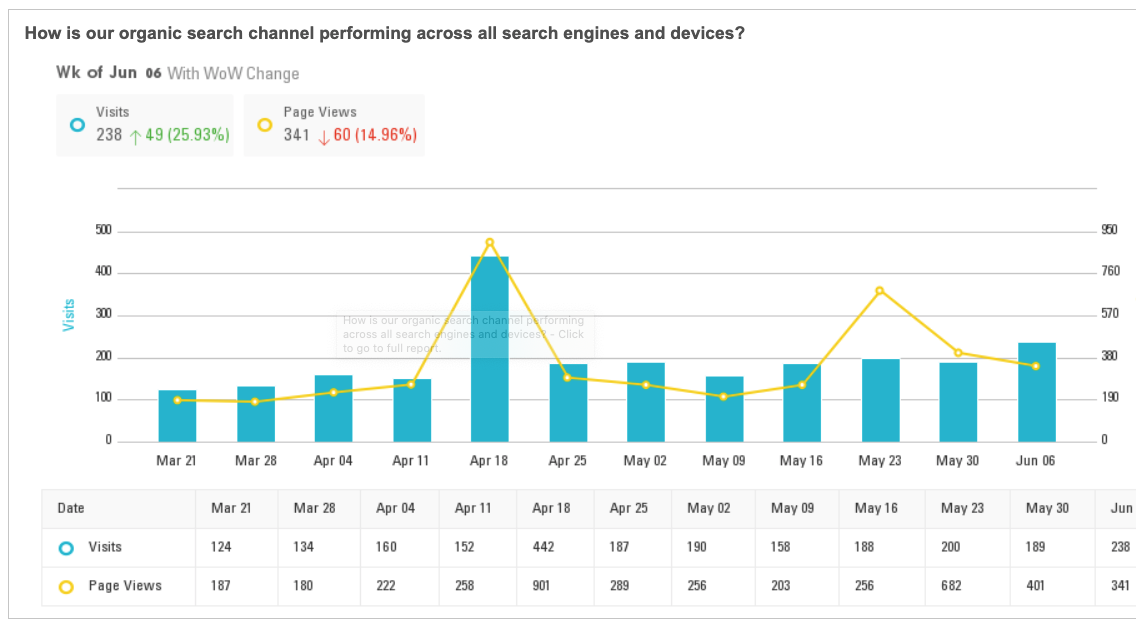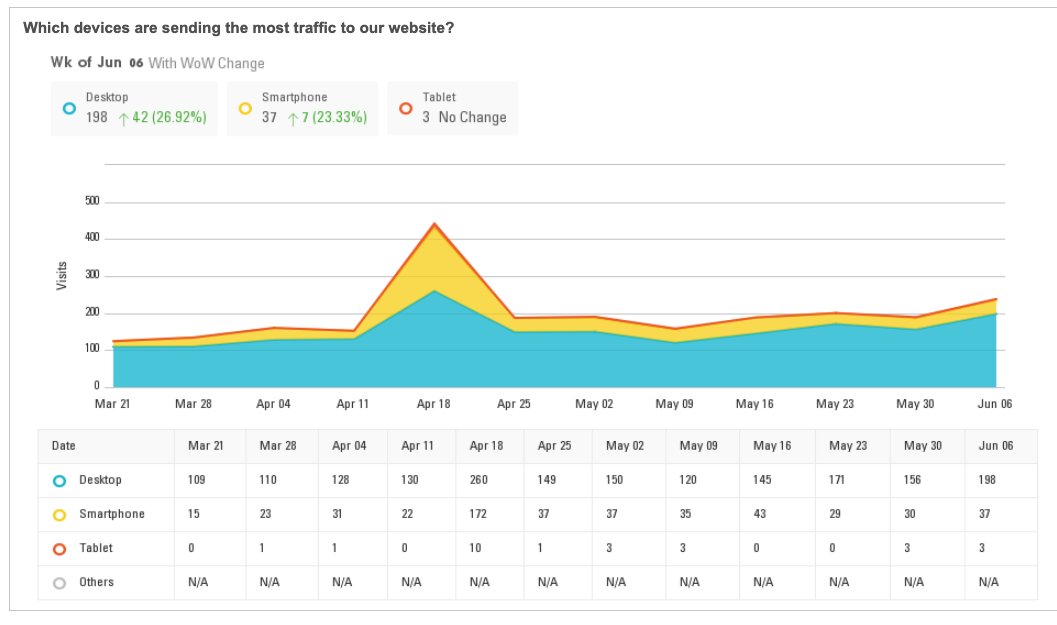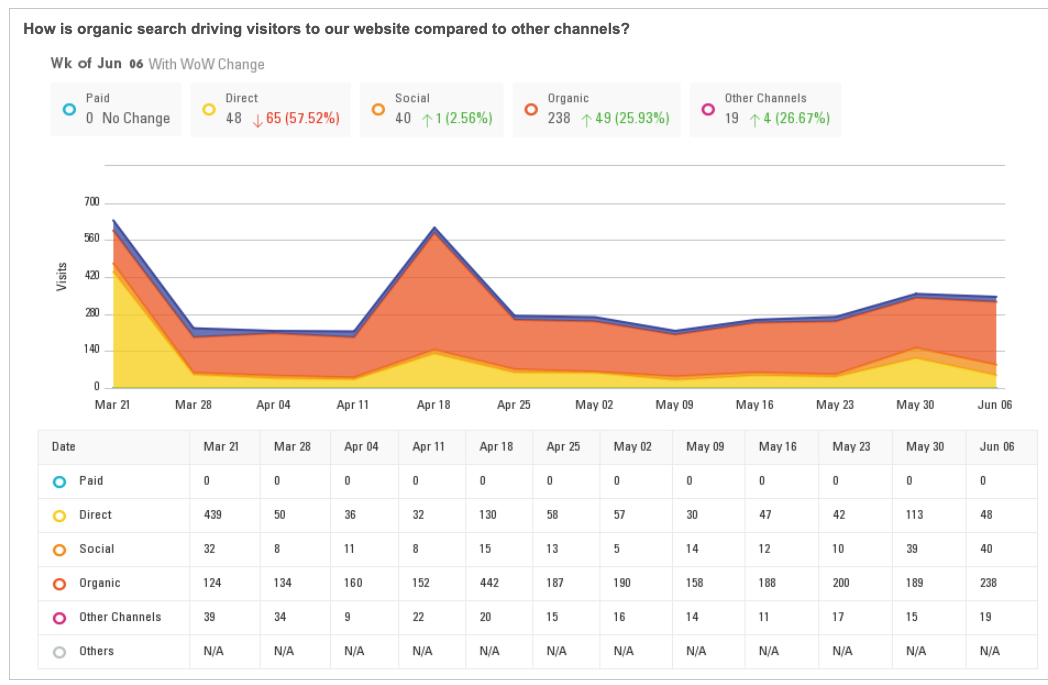SEO Report – Tools & Services
An SEO Report Benefits Your Business by Analyzing Growth Opportunities.
SEO Reporting reveals important trends to gauge the progress of your site and the return on investment for your marketing spend. From site updates to blog content, monitoring viewer engagement and conversions is crucial to tailor future marketing campaigns. Moving ahead without pertinent data is taking a shot in the dark at online success in an increasingly competitive arena.
All Our Clients Get Enterprise SEO Reports, Even the Small Businesses
Generating an effective report means using the right SEO reporting tools to keep track of site evolutions. SEO involves more than checking a few rankings on the search engines. Data must be results-driven to ensure the highest level of success. SEO is a long-term strategy rather than a short-term win. Companies realize an ongoing ROI, making the cost of reporting worth it.
Creating an SEO report powered by an enterprise tool like BrightEdge Data Cube provides invaluable insights to businesses navigating a constantly changing online marketplace. Discover the benefits of using data from these reports to realize ongoing results from your marketing efforts and maximize conversion rates.
What Is an SEO Report?
SEO reports communicate to stakeholders the impact optimization marketing strategies are having on the organization. Reporting goes beyond basic Google Analytics, which most site owners understand how to use for general updates. SEO reports provide impactful insights into current and future trends to maximize SEO efforts.
Reports should indicate the progress made, activities and their value, and recommendation for further growth. Metrics and progress versus predicted KPIs, along with observations on what worked and didn’t work in the marketing campaigns. Once renegade territory, the Internet is now a primary marketing platform for companies around the world. The C-suite and stakeholders want to regulate the progress of SEO strategies to determine the ROI.
SEO reporting is based on metrics and KPIs, and different statistics matter based on the company and its goals. Marketing professionals rely on tools to help them generate concise and complete reports. The BrightEdge Data Cube Score includes the largest data set in the industry, consisting of search terms, keywords, rich media and content, and their performance online. Historical and real-time competitive performance and analysis provide key insights.
What Is an SEO Dashboard?
SEO Dashboards are important for strategic planning for your SEO and to visualize how you are performing head to head with competitors. Customizable dashboards are important because they help you match the exact insights you need to report on. Galileo Tech Media uses BrightEdge StoryBuilder which works with web analytics and data to give you the insights you need. Using customizable dashboards, you’re able to gain insights into the buyer’s journey and your competition. In BrightEdge StoryBuilder, you can eliminate or add competitors to gain deeper insights into who is your true competition. You can find how your content aligns with customers’ search intent, drives business outcome, and impacts brand equity. SEO Dashboards help drive SEO support throughout the company by painting the picture of where you are in search and how you can improve in a way that even non seo savvy C-Suite professionals can discern.Going Beyond Basic Analytics
Did you ever question what an SEO specialist was doing to help rankings and conversion rates? The process can seem confusing, especially since the industry is constantly evolving as Google updates its algorithms. An SEO report goes beyond the basic analytics to interpret the data so it provides meaningful conclusions to the business. In essence, reporting is the communication tool between a professional SEO company and its clients. Three basic aspects of SEO should be covered in the reports: technical, keywords and rankings, and content performance.
Technical SEO
Technical SEO refers to the site’s performance. A functional, navigable site sets the groundwork for effective optimization campaigns. People expect a site to load quickly, with nearly half of consumers expecting a site to load in two seconds or less. Sites must be mobile-friendly to work well on any device.
Other factors are also explored, such as broken links, that detract from the user experience. Visitors should easily find links to what they want, and be able to access those links without getting error messages. Technical SEO reporting includes site performance, security, crawlability, internal linking, and international optimization.
For example, secure sites should be hosted at HTTPS rather than HTTP. If a company changes its blog, internal links to articles might need updating. From the site loading speed to international search terms, the technical aspect of an SEO report reveals what performance aspects need improvement.
Keywords and Rankings
Referred to as a soft metric, keywords and rankings are not necessarily a definitive indicator of a site’s performance. Many SEO experts debate the validity of reporting on keywords because of the changing nature of search engine algorithms. Despite these discussions, tracking keyword performance shows where organic traffic comes from and indicates key industry trends.
SEO reports include a list of industry-specific keywords and where the site ranks for each of them. Studying these keywords for a few months reveal what consumers want most when they visit the site. Gauging their performance shows which keywords are most effective to use in site content and backend optimization.
Keyword tracking also reveals terms that might otherwise be overlooked. Ongoing keyword research is the basis for developing content management calendars, metadata, and future marketing campaigns. Following performance and trends helps companies remain relevant to consumers. Some SEO reports may also include a list of backlinks to track the business’ online footprint.
Content Performance
It takes more than keywords to create top-performing content. Consumers want answers, and the best online content provides them. Well-crafted content also ranks well on the search engine result pages (SERPs), and can attract additional attention from Google. Features such as People Also Ask and Quick Answers drive more targeted traffic to a site without spending extra for ad space. In fact, these boxes appear above ads, making them worth working for to boost rankings, branding, and overall exposure.
Generic and rewritten content won’t make it happen anymore when it comes to rankings and conversions. Content must be original, insightful, and include relevant internal and external links. An SEO report includes the performance of each piece of content to determine what works – and where improvements should be made. Pageviews and time on page and site are assessed to draw conclusions about content performance and engagement.
A one-and-done approach to content means it becomes outdated and falls in ranking over time. Refreshing content ensures it stays meaningful based on keyword research, trends, and updated facts in the industry. An SEO report shows where refreshes and revisions are beneficial to tweak content so it performs better.
The BrightEdge Difference
Questions arise, such as BrightEdge vs. Conductor, and other industry innovators. A marketing professional’s goal is to produce SEO reports that are easy to read yet insightful, without extra jargon. Getting to the point is crucial in a fast-paced business world where time is money, and business owners wear multiple hats. Businesses can peruse the BrightEdge SEO reports in minutes to determine essential insights about marketing, trends, consumer behavior, and conversions. But the biggest difference is technology that determines a site’s blended rank.
What is Blended Rank?
BrightEdge’s blended rank goes deeper than noting traffic numbers and page position. Blended rank tracks the rank for a site’s pages among all types of search engine results including text, video, images, local, and social. As a result, a site that appears to rank at 10 may actually have a blended rank of 14. Knowing this information helps refine site and content updates to improve rankings.
Marketers use blended rank to help sites outrank the competition by spying on the competition, so to speak. An SEO pro tracks the competition’s rank for a client’s keywords to identify competitive trends in rank, and take quick action to correct the situation. Social is used to drive blended rank with activities such as shares, Tweets, and dedicated social media campaigns.
The data provided by BrightEdge helps drive greater traffic, conversion, and revenues. Understanding the impact of blended rank on business results helps sites crawl past the competition and stay on top of consumer and industry trends. The insights help marketers create a content calendar based on keyword research, blended rank, and past content performance.
Achieve Market Penetration
Blended rank is only available to marketers using BrightEdge’s proprietary technology. We add videos and images to content to improve search engine rankings and encourage user engagement. Social media campaigns are developed to drive further interaction and brand a business. Failing to properly gauge the progress of these efforts means missing out on marketing opportunities.
Interpreting blended rank helps site owners and marketers understand site and content performance in a more meaningful way. With a tool to track this crucial data, SEO professionals achieve deeper market penetration. Mobile use and conversion are also tracked, to help capture this growing market. Known as m-commerce, Insider Intelligence forecasted nearly half the total US e-commerce market will be m-commerce by the end of 2020. As a result, marketing campaigns can be localized to appeal to mobile consumers.
Knowledge is power when it comes to long-term SEO. Staying ahead of the curve is crucial to achieve top rankings on the search engines and resonate with consumers. The data provided in BrightEdge SEO reports helps marketers set goals and develop targeted campaigns to reach out to the current market – and even set future trends. Businesses can become leaders rather than followers.
Boosting Blended Rank
Marketers work with management to achieve branding and conversion goals. An SEO report with information such as blended rank, competitor keywords, and content performance helps the team understand what gives a competitor’s site an edge. A quick look at the report shows how content is performing and where the site needs improvements.
Based on real data, SEO professionals develop content to promote traffic and sharing for greater exposure. Pages might be revised to better show the purpose of the website, so visitors can instantly find what they want. Social media and local SEO are also used to improve blended rank. Keywords, trending topics, and past performance all contribute to content development.
Content management improves, too, with insights about current content performance. Revisions and refresh recommendations are made to focus on more effective keywords and information to drive targeted traffic and improve conversions.
An SEO report opens the doors for communication between management and marketers. Rather than speculating about marketing campaigns, management plays an active role in their development and direction. In just a few minutes, management gains crucial insights about competitor success, market trends, and consumer behavior.










